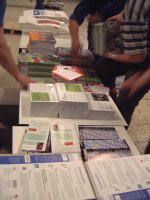June 30th, 2006
Most conferences have some kind of proceedings, a - in most cases - printed collection of papers for each presentation. This is especially important for scientific conferences, where the papers and their publication in prestigious proceedings help the career of their authors. But any conference can profit from having proceedings. They help the audience, because they don’t have to take as many notes. When they get home they can read about the stuff they have heard (or not, if they missed a talk). This is especially important when the conference has several parallel tracks.
Read the rest of this entry »
Posted in proceedings, slides, papers | Comments Off
June 30th, 2006
With the Internet and especially blogging and podcasting getting more popular, we have seen a surge in audio and video recordings from many conferences on the Internet. While some organizers still see this as a threat (’Why would anyone come to our events if they can get the talks on the Internet for free?’), many see it as free advertising or simply do it to get their information out to many more people.
Vanguard in this has been the IT Conversations site (recently broadening its mission under the new name The Conversations Network). Amongst other things they offer for free download audio recordings from many conferences including the popular O’Reilly events. They portion out the recordings from any event over a long time, one talk a week. If you want to get them soon after the conference you can pay for premium access.
Many other conferences do the same for themselves. Not all of them as professional as the TED (Technologie Entertainment Design) event which recently published videos of some of their talks (which by the way are not only technically excellent videos, but also video of excellent talks, go see them). For many conferences those audio and video recordings still have a distinctly home-made touch, but they are getting better and better as people learn to work with the new medium.
So why are they not afraid of loosing customers? Because any good event is more about the contact to other people and the shared experience than for the content or talks alone. Instead of turning them away, possible attendees get a glimpse into what awaits them. And they want to be part of it. And anyway the conference business is different then the book or magazine business. While you can print as many copies of a book as you need, conferences always have a limited attendance.
btw: Have you watched the TED videos like I told you? Did you notice the cluttered look of the stage? Very interesting change from the normal huge and empty stage. It is very subtle, but I think it makes the setting more “comfortable” looking, less like stage and audience and more like a conversation in your living room. Maybe thats something to copy.
Posted in video, audio, multimedia | Comments Off
June 27th, 2006
In her blog face2face Sue Pelletier talks with Mike May about speaker selection. His idea is it to have a speaker database used by all speakers in the world which includes as much background information about speakers as possible, including video clips, photos etc. Conference organizers use it then for finding and selecting speakers as well as for getting promotional material for their event.
I think this is an excellent idea and wish somebody would start this…
Posted in speaker, database | Comments Off
June 27th, 2006
Many conferences have session chairs (sometimes called moderators). Their job differes from conference to conference and between types of sessions. In any case they are in a way the representatives of the conference organizers or the program committee in the room. They introduce the speaker, make sure he has everything he needs and that he ends on time. If the speakers doesn’t do it himself, they can also moderate the question and answer section at the end.
Read the rest of this entry »
Posted in session, chair, moderator, tracks | Comments Off
May 25th, 2006
I have created a mailing list at discuss@hallwaytrack.org for people who organize conferences or are interested in the subject to exchange ideas and so forth. The list is not moderated but posting is allowed for members only. Go to www.hallwaytrack.org to subscribe.
Posted in mailing list | Comments Off
May 25th, 2006
Last week I scouted out a location for a future event that I am planning. This got me into thinking about what it is that I am looking out for.
Read the rest of this entry »
Posted in location, venue | Comments Off
May 25th, 2006
Any place where there are lots of people, things get lost and things get found. So if you are organizing an event think about where the central “lost and found” point is. For smaller events this is easy, the registration or info desk makes the most sense. For bigger events there might be several places, just choose one and communicate this information to everybody in your staff.
When people find something they can bring it there. And if they lost something they can come around and ask if somebody found it. If nobody has found the gadget yet, write down what is missing (with as many details as possible) and either ask for a business card of the person who lost it or his cell phone number and email address. That way you can easily reach him or her, when the thingy is found again.
Posted in venue | Comments Off
May 23rd, 2006
I was at the System Administrators and Network Engineering (SANE) conference last week. This international conference takes place every second year in the Netherlands. SANE is famous for it’s great social events and this year was no exception. The Dutch not only know how to work, they also know how to have a great time.
Read the rest of this entry »
Posted in sane2006, sane, social event | Comments Off
May 16th, 2006
When setting up the schedule for the conference it is always difficult to choose how to end the whole event. Many people will leave directly when the conference is over and travel home. This is especially true before a weekend when everybody wants to get home to have his whole weekend for him and the family. So you probably should not schedule something on the evening of the last day.
And if people think that the last talk or talks are boring they might leave even earlier. So it is important to have some highlight at the end. Popular choices include a famous speaker, a round-table discussion or a quiz show. Whatever you do, make sure your event will end on time. Otherwise people who have to meet their train or plane will leave one after another disturbing everyone else. Instead of ending with the planned bang, the event will fizzle out, leaving everybody dissatisfied.
Generally you also want some kind of closing statement from the organizer at the end to wrap things up, thank everybody who helped, announce the next event etc. And, believe me, you don’t want to stand between the audience and their hard-earned weekend. So schedule this before the last session so that you don’t have to talk to a roomful of people getting up and packing their bags. Also people leaving early will still hear it that way.
Posted in program | 1 Comment »
May 13th, 2006
 Once you have the bags and all the stuff you want to put in there, you need to pack them. This looks like a lot of boring work, but if you have a few people helping you and do it efficiently, it can actually be fun and be done quickly. Put a few tables together and lay out all your material on them. One stack for each item you have. Now you can walk by the tables, take one item from each stack and put everything into one bag. This way many people can work together efficiently without them getting into each others way.
Once you have the bags and all the stuff you want to put in there, you need to pack them. This looks like a lot of boring work, but if you have a few people helping you and do it efficiently, it can actually be fun and be done quickly. Put a few tables together and lay out all your material on them. One stack for each item you have. Now you can walk by the tables, take one item from each stack and put everything into one bag. This way many people can work together efficiently without them getting into each others way.
There are many variation of this theme and depending on how many people, how much material and what kind of bags you have, one way or the other might be more efficient: Sometimes it is better to take a bag and fill it step by step, sometimes it is better to first get all material in your arms and drop it in a bag at the end. If you have enough space you might be able to set it up in a way that you can walk in a loop and do some work on your way back. With some bags it is better if you have somebody else opening them and put them at the end of the line ready for the packers to drop their load into them. Experiment a bit and find your best solution.
 If you have too many people and they get into each others way, some of them are best employed opening up boxes and shrinkwrapped material and replenishing the stacks of material. They can also get rid of the packing material, rip up cardboard boxes etc. This way the packers don’t need to open boxes etc. in between and can work quicker. They can also take the finished bags and move them where they should go, pack them into boxes or whatever. (Keep some of the boxes your material came in for the finished bags.)
If you have too many people and they get into each others way, some of them are best employed opening up boxes and shrinkwrapped material and replenishing the stacks of material. They can also get rid of the packing material, rip up cardboard boxes etc. This way the packers don’t need to open boxes etc. in between and can work quicker. They can also take the finished bags and move them where they should go, pack them into boxes or whatever. (Keep some of the boxes your material came in for the finished bags.)
If you do your work this way you will be amazed how quickly it is done. The key is to have enough people. Doing this alone is exceedingly boring, but with many people it has something of a race and is fun (at least for a while).
(Photos are from LinuxTag 2006.)
Posted in bags | Comments Off


